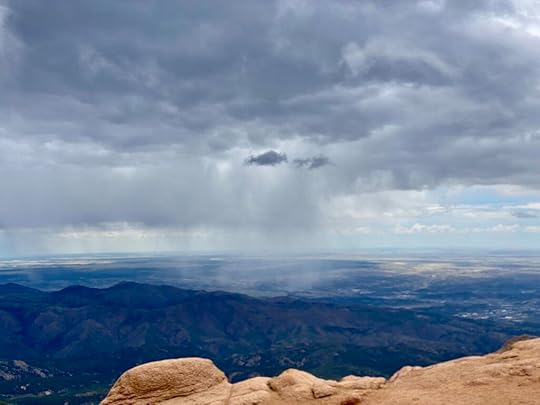Exponent II's Blog, page 97
October 14, 2022
Let’s Talk About Solo Sex
Masturbation. A word not everyone is comfortable saying out loud. A topic many people aren’t willing to talk openly about. Something we should be thinking about whether we are single, married, have kids or not.
Like many topics in the church, masturbation was prohibited and then vaguely referenced and then not really talked about at all. Leaders have not clarified whether masturbation is a sin. It was heavily spoken against until it wasn’t. The specific language was removed, but the implication is still there, as well as generations of leaders and parents who believe it is morally wrong.
I don’t want to tell anyone how they should feel about this topic. What I do hope to convey is the need to examine this for oneself and if one has children, how to navigate this topic with them. I hope to share resources that I have found helpful and point people to professionals.
 Image from Sex is a Funny Word by Cory Silverberg and Fiona Smyth
Image from Sex is a Funny Word by Cory Silverberg and Fiona SmythI think the church actually does aspire to teach correct principles and let people govern themselves. And yet moralizing is often what happens in the day-to-day practice of LDS culture. It’s why LDS sex therapists or educators like Kristin B Hodson, Jennifer Finlayson-Fife and Natasha Helfer, often get questions like, “Is it ok if my kid masturbates?” “Is it ok if I masturbate?”
One of the problems I see with the For Strength of Youth handbook is the populations that it leaves out, and yet its principles are applied to all ages and stages. The language is better in than in the past (including the new line “These feelings are not sinful – they are sacred” which can reduce much of the shame evoked from earlier iterations). However, confining sexual feelings to marriage fails to address how we are all sexual beings from birth to death. I have had many conversations with members of the church who are unsure how to approach self-touch with their young children. They wonder if there is an age when it is no longer ok to explore one’s own body or touch oneself for pleasure. I have spoken to people who wonder if it’s ok for their spouse to masturbate when they are apart. Or people who don’t know if solo sex is appropriate after a spouse has died. Is it ok for a gay man who wondered what place there is in church for his sexuality, knowing marriage would never be an option for him? And what about for the many, many single women in the church? Do the FSY guidelines apply to them? Does the church’s definition of the law of chastity – no sexual relationships outside of marriage – include masturbation or not?
I have spoken with many people on this topic and read many articles on LDS blogs. Maybe this is something you have already figured out for yourself or for your family. But what are the principles being taught at church? In the absence of official clarification, members are subject to leader roulette, with some bishops assuring people they’re ok and some men asking for far too many details. In the recent handbook updates, the church did include that people should not face disciplinary action for self-touch. And yet many members still grapple with the question: is masturbation a sin?
Many of my favorite books on teaching sexual health take a values based approach. In his book, For Goodness Sex, author and high school sex educator Al Vernacchio explains:
A simple definition of the term values is: the deepest-set rules that guide one’s decisions. Values don’t just tell us what we do; they tell us why we do it, which is much more important.
He goes on,
In moralizing, the goal is to instill the parents’ (and I would insert here: the church’s -not God’s) values in their children. Value clarification, though, seeks to have a person develop a set of values that are uniquely their own and defendable.
One of Vernacchio’s fundamental values is that sexuality is good. He likes to say, “Sexuality is a good gift from a good god.” I think this is something many LDS people also embrace – a theology of sex as good and a God who desires us to experience joy. But talking about what that looks like outside of heterosexual marriage doesn’t often happen. For myself and many others, we received simple messages of “Don’t’!” and then, “You’re getting married! Sex is wonderful!” So many parents now are trying to be better about having developmentally appropriate conversations about sex starting when their kids are young. However, masturbation, and especially self-pleasuring for girls, is for many people still taboo.
One of the first books I came across when my own firstborn was young, is From Diapers to Dating: A Parent’s Guide to Raising Sexually Healthy Children by Debra Haffner. Right in the first chapter, Haffner encourages parents to think about what sexual values they want to communicate to their children.
Throughout this book, both [parents] will have opportunities to think about your own values and what you both want to teach your children. I will also try to provide you with the best information available on how to raise a child who will become a sexually healthy adult. I will differentiate between those issues that are based on an individual family’s values, like your attitudes about premarital sex and contraception, and those that would interfere with your child’s ability to grow up to be sexually healthy. For example, your family may want your child to know that your family believes masturbation is wrong, but in order not to instill lifelong shame, it is critical that all children at puberty know that it does not cause physical or mental harm.
This is echoed by Vernacchio in For Goodness Sex.
Do give them facts. You might say, “You’ll hear all kinds of things about masturbation, but it doesn’t do any physical, mental, or emotional harm to a person, and for lots of people it’s a normal part of life.
Really it’s not a question of do or don’t; it’s a matter of what role masturbation can play in helping to develop healthy sexuality. While it’s true that not everyone does, or has to, masturbate, masturbating can be an important way for young people to get to know their bodies. If teens know what feels good to them, they’ll know how one day to tell someone else what they like and don’t like when they’re getting intimate. And for those young people who don’t masturbate because they don’t like it, they don’t want to, or it violates their value system, they need to know that they are perfectly normal as well.
Many people want to know if they are masturbating “too much.” Frequency is highly individual. Vernacchio explains, “I tell my students that the important question isn’t whether they’re masturbating too little or too much, but rather, what’s the place of masturbation in the larger context of their lives?”
There are many reasons why a person might masturbate and that might change throughout one’s life. There are plenty of sources out there on the benefits, but again, the main thing I want to explore is how can we examine this topic thoughtfully and act in accordance with our values? If a prophet at one time said masturbation is wrong, was he speaking for God or from his own understanding and upbringing?
I also think it’s important to differentiate between pornography and masturbation. They are not mutually exclusive. Looking beyond a moral lens, there are many reasons why pornography is not appropriate for children. But is it ok to masturbate without pornography? Is it ok for bishops to be asking children or adults if they look at pornography? Especially when the two are often tied together in the church. I believe if we aren’t telling people it’s ok to masturbate, but asking them about pornography, we’re effectively telling them it’s not ok to masturbate.
We should also be mindful of the situations we or our children may come across at church. When would it be appropriate to have conversations about masturbation or pornography? It’s one thing for me to talk to another adult or my own children. It’s not ok for a person in power – e.g. a bishop – to be asking about my child’s sexual behaviors. It is not my intention to dive deeply into temple recommend or youth interviews, but I will refer to the Mormon Mental Health Association’s position statement on one-on-one interviews. Included in their list of concerns:
Sexual questioning in common LDS worthiness interviews addresses and disciplines behavior that has been deemed normative by medical and mental health associations and best care practices (i.e. masturbation, sexual fantasy, gender non-conformity and presentation of sexual orientations other than heterosexual). We believe this is in violation of human sexual rights (see the World Association of Sexual Health).
They also include the suggestion:
Clarify, improve and edit teachings on what the covenant and promise of the Law of Chasity is. Current rhetoric of “sexual purity” teachings go far beyond the Law of Chastity temple covenant language to include and conflate things such as modesty in dress and language, media, music, viewing sexually explicit materials, and various physical affection behaviors including masturbation, passionate kissing, etc. to be a violation. This is often unclear and confusing to youth, especially in worldwide cultures where expectations, prohibitions and practices of sexuality, dress, gender expression, etc. widely differ.
I remember many firesides when I was a youth where a leader would respond to the general question on sex, “Well how far can I go?” with a resolute, “Stay as far away from the edge as possible!” Almost all of the discussion around sexuality was what was not ok. But what about healthy sexual development? How do we talk about that?
What are our beliefs about when it is ok to experience pleasure? The way it is framed within the church is often that sexual behavior must be in a heterosexual marriage to be legitimate. But is it possible (and healthy) to claim sexuality as one’s own before choosing to share that with a partner? Can we adopt a more expansive view of what sex is? As a culture we have moved beyond sex as an act of reproduction, but do we still think of sex only as vaginal intercourse? What ideas do we have around pleasure? Who should feel it? When? How? (The only function of a clitoris is for pleasure!) Is it ok for a child to masturbate? Is it ok for a teenager to fantasize and self-touch to orgasm? Is it ok for a young single adult? Is solo sex ok for a married individual? Is there a person for whom masturbation is not ok?
In a future post, I would love to continue writing about the intersection of sexuality and faith. Why is it that we so openly talk about the Atonement and forgiveness except in reference to sexuality? Is it fear that saying a person can repent will give them carte blanche for sexual behaviors? What if we approached sexual development as – development? Development of values, integrity, and the connection of body and spirit. And allowed for missteps along the way. What if we taught comprehensive sex ed?? What if we stopped teaching sex from a place of fear and shame? Or that there is no going back? Part of this I believe has to do with our culture’s focus on virginity, especially female virginity and “saving oneself” for marriage. I believe we can do better for ourselves and our communities.
I want to include one last quote from For Goodness Sex, changing the pronouns, so that we can each take a moment to think about our own sexual journey.
What if I could grow up with a critical eye, able to see through the unhealthy messages I get each day? What if I believed I am worthy of love and pleasure just as I am? This really can happen for me, but the first step is to see myself as a fully sexual person and to believe that my sexuality can be the force that leads me to true happiness, not hedonism or heresy.
What are your thoughts on self-pleasure? What are your favorite resources on sexual health? What other topics on sexuality would you like to see discussed here?
References and Resource Suggestions:
For Goodness Sex: Changing the Way We Talk to Teens About Sexuality, Values, and Health by Al Vernacchio, Harper Collins, 2014.
From Diapers to Dating: A Parent’s Guide to Raising Sexually Healthy Children by Debra Haffner, New Market Press, 2000.
I also like the book Sex is a Funny Word by Cory Silverberg and Fiona Smyth, Seven Stories Press, 2015. Full of great questions and fun illustration, this is one you can read with your kids to spark discussions about sex, gender identity, respect and more.
S.E.X. The-All-You-Need-To-Know Progressive Sexuality Guide to Get You Through High School and College by Heather Corinna, founder and editor of scarleteen.com. It is very comprehensive and aims to help normalize sexuality discussions. I love how she gives solid information and encourages people to make their own decisions. Here’s a short quote: “Isn’t masturbation a sin? – Ultimately, in all aspects of your sexuality, you’ll have to figure out how to reconcile your personal ethics and beliefs with your sexual practices”
Sex therapist Kristin B Hodson. I follow her instagram and love how she takes a values based approach to thinking and talking about sexual health. Lots of great ideas and discussion starters.
The Guidelines for Comprehensive Sexuality Education from SIECUS- the Sexuality Information and Education Council of the United States.
October 13, 2022
Cemeteries, Death, and Holy Places
“And as to you Corpse I think you are good manure, but that does not offend me”
-Walt Whitman, Song of Myself

Silent like the trees, like human roots in the soil, the dead are buried. In soundless cities, in cemeteries, humans ceremoniously drive their dead over the threshold and plant them in the garden of bodies. Then the living leave. And the dead stay. I feel in my bones that wherever human death returns to the earth is sacred.
All death returns to the earth, ceremoniously or not, but cemeteries are where I know our dead exist, where I know the dead are buried. However, my Mormon theology has neglected this kind of death, the kind that is buried in the ground. The kind that stays in the earth. The kind I know. Mormon theology builds temples above ground for the dead and then tells me that death does not exist, that our spirits never die, and that our bodies will somehow regrow muscle and tissue and cells that have already become something else.
I’ve always had difficulty grasping and believing in the LDS theology that says death doesn’t exist. If death doesn’t exist, theology erases my experiences with death and the laws of this world. This has caused me to perform mental acrobatics and I have spent most of my life terrified of my doubt, terrified of death, terrified that my loves wouldn’t live forever, but now I am learning to be here, on this planet where death does exist.
Isaiah rejoices, “the earth will give birth to the dead” (26:19). I love this feminine imagery of the earth as our mother, her womb as the soil that holds the dead bodies of her children. This scripture keeps death here, here where our bodies return to our mother who made us, here where the dead are dead and beauty grows from the earth. But we often skip this part and cling blindly to the phrase: “your dead shall live; their bodies shall rise.” Again, theology fails me as it walks past the death that I know, the death of our bodies, and reaches for another ethereal place. A place our dead do not exist.
Mormon theology has split death into two binaries: spirit and body, divine and earthly. But I feel this ripping me, tearing me apart. So, I improvise. Ecclesiastes 12:7 says, “And the dust returns to the earth as it was, and the spirit returns to God who gave it.” This could be viewed as a separation, the body to the earth and the divine spirit to heaven, but for me, God and earth are one. God is here, in me and you and every person who dies; she is the earth. For me, the dust of our bodies and our spirits all return to the God who gave us ourselves, the whole returns to the earth, to God who gave it.
I hope that Mormon theology is right, that our spirits have a magical realm of existence that never ends, but I also hope that God doesn’t just conquer death, I hope she cradles it and witnesses it and never forgets it. I hope she cares about our bodies as much as our souls and that she gives us time to die. Time to be grotesque and time to rest. I hope this is why God exists: to hold death, spirit and body, and then to birth something new. And if she is anything like me, she will want to stay with the bodies she loves as they return to the earth.
Perhaps the human bodies planted in the soil grow silent, sacred secrets with their souls like invisible wildflowers on Her skin. Perhaps these invisible flowers are what I feel as I walk between headstones and read names and epitaphs; perhaps I feel all the invisible things she holds and births from death. Perhaps our spirits linger here like the people on the little island of Sulawesi believe – where soul and body are bound together more tightly, where dead bodies sit in chairs or lay in beds with their living, breathing family all around them for weeks or months, waiting. I like this idea. What if our bodies and souls tarry together when we die?
Cemeteries, like everything, bare the wounds of patriarchy, of wealth, of corruption; I can find no holy place that does not bleed all over me. However, and also, I find the divine in the silence of death, in our rituals of burial and cemeteries and headstones, in this place where my worthiness is never questioned at the gates, where dead bodies cannot build their own spaces so the living create spaces for them. Somehow, these spaces designed for the dead alleviate my dread of death. Temples, where souls are separated and saved, feed my obsession and fear of death, but cemeteries, where bodies are laid to rest in the earth and where I can imagine soul and body together, are a refuge for me; cemeteries offer me peace and silence in all that I can and cannot see. There are no answers here, only bodies.
When the dead cross the threshold of a cemetery, they join the silence and mystery of death, and when the living cross the threshold into the garden of death, they step into the invisible mists of memories and whispers of not another world, but this one. A world that gives me hope that God exists here to hold all the things, living and dead. Humans practice many religions and rituals, most conquer, but the truest truth I have found is that humans die. Every single one. So, I step onto the holy ground of cemeteries where I know our dead exist.
October 12, 2022
Another Monument of Another Dead White Man
I’m tired of monuments to dead white men.
I know too much of them and too little of the things that are mine. I know the day men stormed beaches and shot muskets and rose from the dead, but I don’t know the feminine things. I don’t even know how to name all the things we’ve lost: the rhythm of growth and death and rebirth which should be ours. We’ve lost red tents and blessings with frankincense and our sisters’ hands on our bodies while we labor. We’ve lost the susurrations of healing and the lullabies of death.
“We lost track of the purpose and reason for life. We began to forget our songs. We forgot our stories. We could no longer hear or see our ancestors….”*
Joy Harjo warned us there are no female deities in the Trinity and I think about that every day. Religious phalluses break the skyline and the tithes used to build them represent food taken from the poor, medicine from the ill, homes from the unhoused. There is blood on those bricks, literal and figurative, blood that will cry from the ground for…what? Vengeance? Men have created a wrathful God, a God of fire and brimstone, a god who doesn’t speak to or for me. When the god of men is angry, he sends floods and plagues, turns women to salt. We need less destruction and more creation. Pele-honua-mea brought fire and life to the islands Maui pulled from the ocean. Pele, Maui, Nāmakaokahai together, created land where life thrives. We need their expansive creativity.
The quotes of white men consume our religious spaces and pop psychology. Freud said we were primitive and now we can’t speak in boardrooms unless we drown our feminine in the masculine. Someone misread Darwin and now his sycophants tease white women with the allure of proximal power with one hand while they suffocate us all with the other. If we want less division, we’ve got to understand how and why we’re divided. We need to stop stepping on our sisters while we climb the ladder of white patriarchy.
Men designate buildings ‘sacred’ and then control our entrance to those buildings. They stand at the altar and decree light and dark, earth and water, but their binaries have left out the twilight and dawn, the marshes and ocean strands. We’ve lost the sacredness of these transitional realms.
 Elijah tore down our holy places and burned our prophets. I crave woods so dense we tell stories of dryads walking. I long for selkies in the salt water, huldrene in the forests. I want Baba Yaga, walking.
Elijah tore down our holy places and burned our prophets. I crave woods so dense we tell stories of dryads walking. I long for selkies in the salt water, huldrene in the forests. I want Baba Yaga, walking.
Men invade our myths and make them ugly. They call us “Scylla” or “Medusa” and we believe them. I want new stories. I want Daphne to love Aphrodite. I want Medea to wear the crown. I want Jezebel redeemed.
Statues of white men crowd each other with their consuming greed. Men who ravaged the land and the people now gaze down from pedestals they erected for themselves.
I’m tired of symbols of oppression littering our view. I see their flags on the land they devour, celebrating the wars they start. We commemorate those we lost, but not those we stole. We honor those we sent to die but not those we bricked up in the walls of our empire.
Our heroes enter coffee shops, walk down streets, drive through our neighborhoods as a violent reminder that our system functions by force, not community.

They’ve named everything after themselves, from rivers to my body parts. They rename pieces of Earth “Big Boobs” and “Bald Knob.”
They cage the earth. They steal the land, all the land, and then they suck it dry and leave it barren.

I want Freya to unveil a future better than our present. I want Yemaya to cover up our sorrow.
I want Ala to send earth surging over concrete and steel. I want flowers and vines to agitate borders. I want a riot of colors breaking boundaries.

White men have beaten their heads against the pillars of our world. The corners of the earth are caving in. We need the living Nüwa to rebuild them. A wrathful, jealous god tore us apart and scattered our pieces; we need Isis to gather us together and make us whole.
I want curves instead of angles. I want twilight and marshes. I want a soft spring rain to feed our parched earth. I want the wind to whisper the stories we can’t remember, the ones we understood wrongly. I want moss to creep over their monuments; kudzu to fill their halls and museums; bamboo to crowd their manicured groves. I want vistas unfenced, rivers undammed.



I’m tired of all these white men taking up all our space. We’ve been relegated to a postscript: a tool for the gods or a cautionary tale. I want to see us, in our power, rise up and regain what they’ve tried to take from us. I want us to become the legends we need, to pull together the threads of our stories and make them epic, mythical, earth-filling and life-giving.
We know too much of the destructive and not enough of ourselves. We have lost more than I can bear.
I want I want I want….

*Joy Harjo, “Rabbit Is Up to Tricks,” Conflict Resolution For Holy Beings.
October 11, 2022
Menopause and Me Blog Series: Call for Submissions

As I’ve prepared for my upcoming hysterectomy and oophorectomy, I’ve been surprised at how few resources there are related to menopause, and especially surgical menopause. While I am hopeful this will change in the future, medical research has been grossly underfunded for something that most women will experience in their lifetime.
Along with the lack of medical research, we have too few stories about menopause. While the topic occasionally comes up on Mormon feminist blogs or publications, there aren’t many accessible stories about menopause by Mormon women. Let’s change that.
We want to hear from women and gender minorities who either anticipate or have experienced menopause. What menopause stories have you heard from your female relatives? What was the change like for you? How has perimenopause or post-menopause affected your relationship with yourself, your body, or your loved ones? Have you experienced early menopause or chemical/surgical menopause? How are menopause and medical access to care (including hormone replacement therapy) feminist issues? If you are trans or intersex and will either not experience menopause or will differ from the typical pattern, what does menopause mean for you? Has your relationship, parenting, or fertility status affected your feelings or experience with menopause? Has menopause impacted your experience at church or your spiritual life? Have you ever discussed menopause or had an activity centered on the topic at church, and if so, how did it go?
Please email your guest post (typically between 600-1400 words) to KatieOnTheBlog at gmail dot com by December 31, 2022 to participate in the launch of this series in January 2023. Please include a 1-2 sentence bio, the moniker you want to use for publication, and 1 or more open-source images or images that you own the copyright of to include with your post. Unsplash is a great option for finding open-source images.
October 9, 2022
Ask the Readers: Scripture Study
I wasn’t raised in the church. My family celebrated Christmas, but that was more or less the extent of my religious upbringing. But my parents had received a Bible as a wedding gift, and it sat on a bookshelf. I was a voracious reader as a child, so from time to time, I picked it up off the shelf and would read it. I never made it past the first few chapters of Genesis because King James English is a bit advanced for a 5-year old, even a highly literate one.
I joined the church as a Beehive, and I decided to dive head-first into making up for lost time in my spiritual education. In Seminary, one of my teachers challenged us all to read the scriptures every day, even if it was only a verse. I decided to take up the challenge, and for the most part I was pretty good at sticking with it.
By the time I went on my mission, I had graduated from Institute and had read all of the Standard Works multiple times. On my mission I read them again multiple times. Sometime after my mission I fell out of the habit. I’m not sure when it happened. It was gradual – first I would miss a day or two, then eventually it would be weeks since I had picked the scriptures up outside of church. I was still actively attending church, and I was participating in the Bloggernacle and/or Mormon-themed Facebook groups daily. But going back to primary sources had gone by the wayside.

Every time general conference rolls around, there are several talks about scripture study and I remind myself that I should get back into the habit. Like clockwork last weekend, the Spirit reminded me once again that I need to spend more time in the scriptures.
I’ve tried setting up a calendar that emails me my reading assignment for the day each morning, but I get so much email that it gets lost in the shuffle. I’ve tried listening to audio scriptures as I commute, but I work from home now so I commute less. I’ve tried reading first thing in the morning, but I’m too rushed. And I’ve tried reading before bed but I’m tired and fall asleep.
What I’m doing isn’t working, so I’m open to ideas. How have you worked scripture study into your busy lives? How have you started the habit after years of falling out of it?
October 6, 2022
Guest Post: Quiet Quitting Church
Guest Post by Anonymous. Anonymous eats, thinks, and reads too much. Occasionally, she also cleans house and writes. But mostly eats.
Reading the headlines, I realize I’ve been quiet quitting church for a while now. Ward members might say I’ve lost my testimony, that I didn’t really understand the gospel, that I’ve been seduced by the philosophies of men and have wandered off the covenant path.
None of this is true.
The truth is sitting in church is just too painful. Instead of uplifting and filling my lamp with oil, church exhausts me. I wait, teeth clenched, for the next stone to be thrown as members congratulate themselves, virtue signaling their alignment with God.
It feels very performative and less than what Christ would have us do.
Like many active members today, there was a time when church was my life. God expected sacrifice, obedience, and submission—the Law of Consecration made that clear. Naturally, this can cause discomfort as you give up good things for better. There’s no glory without cost.
I didn’t go on vacations, spend time boating or camping with family on Sundays, or look too closely at job opportunities that would have taken me away from my family and ward. God needed me to be his hands in all things—and that work was never done.
There were always meals to bring in, committees to serve on, refreshments to bake, camps to coordinate, lessons to teach, genealogy to research, and people to visit. It wasn’t unusual for me or my husband to spend twenty hours or more a week as God’s hands.
Of course there were things even back then that chaffed. Sticky doctrinal points that didn’t jibe with my experiences and quite a few church policies, but with my shoulder pressed firmly against the wheel, I had a remarkable capacity to ignore the stones in my shoes, the weight of unacknowledged burdens, the imperfections of people.
It was six years ago that my son, then a freshman at BYU Provo, told me he was bi and wouldn’t be going on a mission. My bright, intelligent son who loved Christ and the gospel more than anyone I knew, suddenly had no place in our faith. I stood up from the wheel and really took in the view.
In those six years, I’ve studied, prayed, volunteered in the temple, and listen, listen, listened for answers—and they came. As I heard that still, small, undeniable voice, I understood that these revelations were mine, meant only for me and my family, but they gave me hope. God isn’t finished organizing his church yet. Patience, patience, patience, the voice counseled. I got this. I planned for this. It’s going to be all right.
Six years later, my son is very happy, living with a boyfriend several states away and no longer active in church. He’s thinking about weddings and adoption. Even my husband, Mr. Traditional, sees the difference in our son’s countenance as he navigates successfully through the world as his true self. Where he was once a bundle of dysfunctional anxiety and depression, he’s bright again.
But back to quiet quitting church.
A while ago, I stood up in fast and testimony meeting and said that I was going through the toughest time I’d ever experienced and that it was overwhelmingly hard. The ward knew about our on-going challenges with aging parents and in-laws as we supported them through multiple strokes, rehab stays, cancer, cognitive decline, and Parkinson’s. To be fair, they did not know that my husband had also lost his job, that our son was dating a guy, that I had serious health troubles of my own, that our missionary daughter had seen people shot, that I was in the middle of a faith crisis, or the myriad other major life events that were crashing down on us like piles of bricks. But I did say I was struggling mightily.
Crickets.
From a ward I’d been highly active in for over twenty years.
That was the start of my quiet quitting, although I didn’t consciously think that at the time. I asked to be released from my calling in Young Women’s because of the time commitment and simply stopped saying yes to everything else. I spent time with non-LDS family and mended broken bridges and hurt feelings. I went on long trips and didn’t worry about who would teach my classes or minister to my families. I spent less time in the pews and more time in contemplation and study, Marie Kondo-ing each aspect of my faith to see if it still served.
What, I asked myself, is the least I can do and still be worthy to be with my return missionary daughter when she’s eventually sealed in the temple? How do I mother two very different children? And what, exactly, do I want my life to include? What feeds my soul? My focus had been as a wife and mother because I thought God demanded that of me. Is that what I still wanted?
My life was a backpack that I’d never emptied and now was bursting at the seams. I’d reached the point in my mortal journey where things had to change—things left, added, or shifted and the bag repacked—or I wasn’t going to make it.
There’s another component to quiet quitting a job: acting your wage. I started experimenting with what my real responsibilities were and discovered that church was perfectly fine without me. Lessons got taught, meals were made, committees served.
Church, however, was not perfectly fine without my husband who continued to attend and serve regardless of whether or not I went with him. It’s his quiet way of affirming what feeds his soul.
Crickets on that from the ward too, by the way.
From emptying my backpack I learned that I’m the same person wearing garments or not, going to every church meeting or not, wearing my wedding ring or not. It didn’t matter if I was continually worried that I’m not sacrificing or suffering enough or was just comfortable waiting for the day’s requirements to reveal themselves. I’m still honest in my dealings, faithful to my husband, an engaged mother to both kids, concerned about the well-being of my neighbors, and have charity in my heart. I’m figuring out how to be a disciple of Christ in a way that makes sense to me within and without the church.
I know my quiet quitting of church is a transitory coping mechanism. It’s not sustainable because neither church nor I are geared that way. But maybe instead of forcing myself back onto the hamster wheel of faith that I thought God expected of me, I can find a new way to serve that allows me to be all in without losing myself.
I kinda missed her all these years.
October 5, 2022
Join Us for the Fall 2022 Magazine Launch Party
Four times per year, the Exponent II magazine hosts a virtual launch party—a highlight you don’t want to miss. We are thrilled to announce that on October 13 at 6 pm MTN / 8 pm EST we will be treated to a presentation by the contributors of the fall issue on friendship.
Register here to attend the launch party.
What is a launch party?
A launch party, common in publishing, is a formal celebration of a forthcoming book or magazine issue—a place where contributors share parts of their work for an audience to honor the hard work they have done. A launch party is like the movie trailer for the issue and a way to build community among contributors and listeners.
What is the agenda?
Introduction – the host/moderator welcomes everyone to the group and acknowledges the writers and artists on the callCover reveal – the first glimpseLetter from Editor – the first glimpsePresentations – each contributor, depending on the number participating, will receive up to 4 minutes to present. Writers will read a portion of their work and artists will share an image to discussQ&A – With host acting as moderatorConclusion – Thank everyone for coming and those who have worked on this issue, share next stepsRegister to attend at tinyurl.com/fall22party
We look forward to seeing you there!
October 4, 2022
Guest Post: A Gateway Drug to Becoming a “Bad Mormon”
 Guest Post by Anonymous. Anonymous is a young professional living and working in New York City just doing their best.
Guest Post by Anonymous. Anonymous is a young professional living and working in New York City just doing their best.
“Once I do this, there’s no going back,” I thought to myself as I looked at the gummy candy in
my hand, indistinguishable from a Sour Patch watermelon but for one key (and totally legal in
New York City, by the way) ingredient. But then, a second thought occurred to me almost as
quickly: There was no going back anyway. That’s how time works, dummy.
Earlier that day, I’d committed to the very mild rebellion that had been percolating in my mind for
months by actually procuring a small sample pack of gummies from a local dispensary. Still, I
was telling myself that if I did actually follow through, it would probably be a one-time thing just
to satiate a curiosity I’d always had but never imagined I’d actually act on.
I’m sure most people don’t need to have major philosophical conversations with themselves
before trying something that science has confirmed is relatively harmless (and, once again,
totally legal) once. But most people also aren’t members of – and trying to remain in – what is
referred to as a “high demand religion.”
On the one hand, the “high demand” of putting my time and talents to good use within and
amongst the church community has been really beneficial throughout my life. I’ve learned a
great work ethic, forged important relationships, and generally formed a practice of turning
outward with love and service. On the other hand, the somewhat stricter code of conduct leads
to a lot of black-and-white, in-or-out frames of reference and cultural norms. Orthodox Mormons
really like to say that there is no such thing as “cafeteria Mormonism” where you get to pick and
choose which commandments you will obey. Knowingly and purposely breaking a
commandment would be a mistake.
So the fact that I had arrived at the point of not only considering testing out a substance that is
implicitly against the Church’s strict health code (and more explicitly warned against by modern
leaders), but having it in my hand ready to consume, was a big deal. Honestly, I had kind of
surprised myself, a life-long “good girl.” My interests and curiosities fit pretty comfortably within
the confines of the rules, so rebellion never held much allure for me. I have always viewed my
ability to win Never Have I Ever against anyone with pride.
While my obedience to the tenets of my religion has never been fear-based for me, the
emphasis on “thou shalt”s and “thou shalt not”s in a high demand religion did shape my way of
thinking and how I approach decision-making. Repentance, or getting back on the right track
after making mistakes, sounds like a lot more work than just not doing something when you’re
told not to do something. There had to be a reason we’re encouraged to avoid doing these
things, right? Not to mention, spiritual leaders throughout my life have preached that the
blessings of obedience would be clarity and peace of mind. Clearly, purposeful disobedience to
God would never prove to be worth it.
Like most aspects of my privileged worldview, this perspective was ripe for a remix when the
pandemic arrived and upended life as we knew it. I’m sure I don’t need to recount every global upheaval and personal trauma of the past two years to paint the picture of just how unclear and
unpeaceful it was, regardless of my adherence to the rules. Global emergencies undeterred by
thoughts and prayers, the stark inequalities they made apparent, and the disappointing silence
from Church leaders on these pressing issues sparked a faith transition for me – not out of
Mormonism, but within it.
Suddenly I was seeing how keeping myself safe within a bubble of unquestioning obedience
had kept my spiritual and intellectual muscles from fully maturing, leaving me unprepared to
face the harsh realities that quickly piled up in 2020. I was hungry to live more intentionally and
learn by experience rather than second-hand stories. I felt myself shifting from what Richard
Rohr calls “first half of life” spirituality – that of a transactional, “one rule obeyed equals one
blessing received” relationship to the Divine – to “second half of life” spirituality, marked by a
greater focus on personal agency and transformation.
With all of this stewing in my mind for months, I sat there with the forbidden gummy. I wasn’t
looking to go out and break every rule I’d ever been taught – I was just trying to follow my
curiosities and not be held back by clinging too tightly to my “good girl” title. I had arrived at this
moment not by convincing myself to abandon my principles or rationalize something I felt was
wrong, but by carefully considering what I wanted and how to do it while staying aligned to my
values.
So I did it. I ate the gummy. And I had a pretty uneventful experience, to be honest. I guess a
lifetime of being told to avoid doing something like this at all costs had built up an expectation
that it would be an incredibly impactful experience, for better or worse. But it was just…fine.
Shrug-worthy, even. The fact that it was almost a non-event opened my eyes to the power I had
let the fear of being wrong, of not living up to every standard set for me, have over my life.
Maybe in the future, I’ll look back on it as a mistake. It’s now a finger I get to put down in Never
Have I Ever, at least. But it didn’t change my beliefs or the way I show up for my church
community. It didn’t weaken the relationship I feel that I’ve cultivated with the divine. Maybe my
mistake all along was thinking in absolutes. In thinking mistakes were something to be feared
and avoided rather than utilized for growth. And maybe that will make me a “bad Mormon” in the
eyes of some members of my church. But I’m starting to see that my biggest mistake has been
living within the approval of others, even spiritual leaders I turn to for advice. Rules and
guidelines definitely have their place, and I’m not looking to go taste every “forbidden fruit” just
to say I did, but maybe it’s time I start bending and breaking some rules with intentionality to
learn what practices and boundaries work best for me, regardless of what others think.
But also, nobody tell my mom.
I sent my children to daycare – when I was a stay at home mom

Photo by BBC Creative on Unsplash
Most of Elder Christopherson’s talk during the Saturday Afternoon Session of October Conference was uplifting. He talked about belonging and how we should recognize that many people are at different stages of life. I’m hopeful that most people will remember that message from his talk.
However, I am a little worried that one part will cause problems for mothers. There was a section of the talk where he talked about personal sacrifice. He quoted a conversation printed in Deseret Magazine from a woman named Christina.
Christina was recounting the “worldly” advice other women her age sometimes gave her. The part that stuck out to me was when the advice went like this: “Are her children annoying her? Then she should send them to daycare.” Here Elder Christopherson paused as if to indicate what a terrible attitude that was. Then he goes on to talk about how suffering is part of life and it teaches us to be better.
This was only a small part of his talk. But it was the only part of the conference when I audibly responded to anything that was said. I replied out loud, “No! Daycare is sometimes necessary!”
This hit me strongly because there was a point in my life when I put my children into daycare even though I wasn’t working. I was encouraged to do this by an LDS woman.
When my youngest daughter was four months old my husband’s Army unit was deployed* to Korea for nine months. My son was one and my twin daughters were three. I was the sole caregiver for four children ages three and younger.
Many people helped my family during the nine months my husband was gone. Some of the most helpful people were the Military Relations Missionaries assigned to our stake. We’ll call them Elder and Sister Smith. The couple came over weekly to help with whatever I needed. Sister Smith would play with my kids while Elder Smith mopped my kitchen floor. He mopped that dirty, cereal covered floor every week, and I will never forget it.
During one of her early visits Sister Smith talked to me about the hourly care that was available at the daycare on post. Because my husband was deployed our family was eligible for 16 hours of free hourly care per child each month. I knew about this but I hadn’t signed my kids up yet for several reasons.
1. The application process involved a lot of paperwork and appointments. 2. I wasn’t sure 16 hours a month was really worth it. And 3. I’d been conditioned my whole life to think that daycare was something evil to tempt mothers into giving up on raising their children. (I wish I was making that last one up.)
Sister Smith countered my concerns with expert care. 1. She offered to come with me to the required appointments to help with my children while I filled out the forms and did the interviews. 2. She told me about another mother who treated the hourly care like a pre-school. That other mother always made sure to schedule the hourly care on the same day of the week for 3 hours. That sounded worth it and doable for me.
As for my third sticking point. The one where I thought daycare was evil. I never voiced that concern out loud to Sister Smith. It was just something I was carrying around in my heart. But I think she knew that I was concerned about leaving my children. She’d often say things like, “you need a break from your kids so you can be a better mom when you are with them.”
We made it through the interviews and the paperwork and the doctor’s appointments. I signed my children up for their first session on a Tuesday morning. I felt so guilty about dropping them off at the Child Development Center. I felt like a terrible mother. Like somehow I was a failure for not being able to meet all of their needs all the time. That sending them to hourly care – even for 3 hours a week – was a sign of weakness.
I had to give myself a pep talk and remind myself that I put the kids into hourly care so I could be a better mom.
That first session went well. The children all did fine in the new environment. I was able to go grocery shopping without children for the first time in a long time. I continued to sign my children up for hourly care on Tuesday mornings.
I figured out that it worked the best to drop the kids off in time for breakfast in the morning and pick them up right after lunch three hours later. That way there were two meals that I didn’t have to prepare. I’d pick them up just in time for naptime so if everything went well I could put them down for naps at home and have a little more time to myself.
Occasionally I’d sign up only three of the children for a session and then take one child with me for some rare one-on-one time. But that came later. For the first several months I reveled in this new found freedom of three hours on my own.
What did I do during the three hours of alone time? I know that at least one time I went back home and took a nap. Usually I’d go grocery shopping. Sometimes I’d do things like take the car for an oil change or get a haircut – basically any errand that would be a hassle to bring children along. I’d usually drive our second car during these rare solo adventures. The car didn’t have enough room for four car seats so I couldn’t drive it when I had the kids with me. The car needed to be driven regularly so that its engine wouldn’t have problems. I realized that I was kind of the same way. I needed a chance to be alone so I wouldn’t have metaphorical engine problems.
I’m sure that from the outside it looked like my kids were “annoying” and I sent them to daycare so I could get away from them. But really this was an important act of self preservation. I have no idea what my mental state would have been like without that three hour break each week.
This experience completely changed my attitude about daycare. Three years later my husband left the Army and went back to school for another degree. I worked while he was in school. By this point the three oldest children were in elementary school. The youngest had to go to daycare all day and the older children joined her in the afternoon. I had no qualms about sending any of them to daycare because of that stint we’d done at hourly care.
I’m so grateful that Sister Smith had the wisdom and foresight to urge me to sign my children up for hourly care. I wonder how different things could have been if Sister Smith had tried to give me a pep talk about sacrifice instead of urging me to put my children into hourly care.
I’m curious about your experiences with daycare. What are the reasons you put your children into daycare? What motivated you? Did you worry that other people would think you were just doing it because your children annoyed you? Do you worry about that now that Elder Christopherson included that quote in his talk?
*Technically my husband was on TDY (Temporary Duty Assignment). But deployed is the term most civilians understand so that’s what I usually call it.
October 3, 2022
Why Representation In General Conference Matters
A few years ago, I had the opportunity to attend General Conference for the first time in person after traveling to the United States on what I now call “The Great Grief Trip of 2018.”
I knew the world I stepped into would be different, yet I held onto the hope that my membership would all but connect me with the people I met on my travels. I told myself that my race, education or even socio-economic status didn’t matter as long as I had the same testimony that the church was true as everyone else.
Almost immediately, I stuck out like a fly in soup. While my host family was wonderful, being the only “other” at church reminded me of how far away from home I had gone for the sake of recuperation. Luckily, everyone was friendly and welcomed me into the fold as if I belonged there.
Despite the warm welcome, one of my most vivid memories of my trip happened as I strolled through the aisles of Costco with my hanai mom Jolyn as we played a game of how many black people we could see that day.
This game to most may childish but when surrounded by faces that did not reflect the realities of my life and my shared experiences, it was impossible to feel at home. Jolyn and I accepted the challenge becoming excited each time we spotted someone who looked like me.
As the days passed by, I sought out faces during those early days to feel a connection to my identity. It was highly unlikely that I would find another Caribbean person unless I took a detour and made a quick road trip to BYU-Idaho.
Eventually when I ventured south and crossed state lines, I quickly discovered that my skin stuck out more than my thick Caribbean accent. Quickly, I recognized that the melanin content meant that I was greeted with more curiosity than I had ever experienced in my life. Still, I soon settled into in the young single adult wards Provo even if I was still the only woman of color present during ward prayer.
Despite the support of my friends who had just returned from their mission and the supportive sisters in my ward, no true sense of community filled my soul. There was no one who looked like me. There was no one who sounded like me. I eventually began to hang my church membership around my neck, flashing it like a badge in an attempt to prove my worthiness. Still, even when my contribution was acknowledged, there was little sense of belonging that stirred in my heart.
Once returning home, that feeling of belonging returned. I knew who I was and where I was loved and supported. I recognized that there was no need to suppress my personality in a culture that understood me. There was no need to shush for the sake of being Mormonly.
In time, the community feeling evaporated when I moved into my new branch. I didn’t like it there and soon spent more time counting planes flying overhead than listening to the speakers each week.
Still, I held on for years hoping that the tides would turn. And they soon did.
I first felt that true sense of belonging when Peter M. Johnson was called as a General Authority. Sex aside, the words I felt come from his mouth filled me with a spirit I hadn’t quite felt before. I recognized the enthusiastic vigor and vibrance in his words as it warmed my soul from the inside out.
Following his talk, I remembered the excitement as I gushed with my friends about the light that radiated from a different experience during General Conference. I was so excited to finally hear a different way to deliver a gospel message over the pulpit.
I took heed of his words, choosing to share the gospel more sassily than I ever had in my life. I wiped my slate clean, went back to the drawing board and found new and engaging ways to share messages of love, hope, faith and endurance.
Some might think that my burst of vigor has nothing to do with representation. In fact, it has everything to do with it.
While most members of the church absorb the speakers’ thoughts shared over the pulpit, the feel-good euphoric vibes sticks around for a brief moment. To reabsorb it, we log into our social media pages, visit the Gospel Library App and make tedious notes that allow us to deeply understand the speakers intended message. We then connect the words spoken and their meaning into a new context that we take with us throughout our lives.
On the other hand, when saints of color who crave community and visibility the experience is far different. We recognize immediately that a speaker looks like us, that our accent is accepted during these few moments or that we can even recognize that the person may reside in the same country or region that we do.
This becomes our identifier. Once we recognize these identifiers, we then follow a chain that allows us to both connect and understand the speaker on a deeper level. We recognize their appearance first. Does the person look like me? Do they sound like me? Once we established the common relatability, we seek to home in on the “feel good” moments the speaker gives. Do they mention their culture? Do they mention their upbringing which may be similar to ours?
We may often choose to focus on pride next. Does this person with their shared cultural values instill pride in myself as a saint of color or as a saint who lives in the same geographical location? The pride exhibited here is not selfish. It doesn’t boast. It gives us a sense of purpose, belonging and identity that fills our hearts long after the speaker has concluded their talk. Lastly, we focus on the message. We dig deep to understand what they say and how they say it. We recognize their tone, their stance and the conviction behind their words.
For saints of color, our opportunities to shine are few and far between. Still, we seek to feel like part of the community, even if the faces whom we come to know, and respect don’t look like us.
Over the years, I resigned myself to the fact that it would be a rare occurrence to see a woman from my region to speak during General Conference. I prayed and hoped the day would come. I understood that things needed to work in their order and in the time Heavenly Father saw fit.
During last conference, Sister Tracy Y. Browning was called to the Primary Presidency. I celebrated the appointment with my institute class, comprising of mostly Jamaican young adults who cheered on wildly as someone from their homeland was acknowledged.
This was more than a Jamaican thing. This was more than just one island of saints celebrating the news. Instead, Caribbean Latter Day Saints finally had reason to feel immense pride.
As I sat watching Sister Browning on Saturday morning like many others around the world, my blackness reflected back to me. I felt the spirit in her words and in her culture. I felt solidarity as I noticed her hair looked like mine and probably felt like it too.
Some would like to believe that representation doesn’t matter. They try to reduce the sense of belonging so many crave to be a carnal, selfish or even naive request. Why should we want to seepeople who look like us when we already know that we are a worldwide church?
It matters.
It matters to the brown and black child who may realize that a speaker looks, sounds or resembles them. It matters to the young woman struggling to accept who they are and see it reflected in a speaker. It matters to those who choose to erase their cultural identities for the sake of fitting in in spaces where they feel ostracized. It matters to girls like me who see a speaker embrace their natural hair against the societal pressures to adopt Eurocentric beauty standards.
In a church like ours, representation does more than crosses off a diversity quota.
It fills us with belonging and with pride. It allows us to know that we too bring something to the table and that our voice are valuable and contribute to the restoration of this church here on the Earth.








